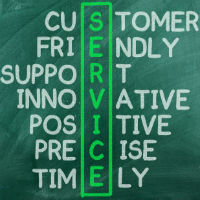 Many people have an easier time defining poor customer service than they do good customer service. That is, they can’t always articulate what quality customer service is, but they could write volumes about what it isn’t. Why do you suppose that is? Has customer service become a lost art? Some people believe so.
Many people have an easier time defining poor customer service than they do good customer service. That is, they can’t always articulate what quality customer service is, but they could write volumes about what it isn’t. Why do you suppose that is? Has customer service become a lost art? Some people believe so.
Here’s why customer service still matters for businesses and how you can empower employees to please customers.
Why Customer Service Matters
Your Window Is Open
In any industry, a company’s front-line employees—those who interact directly with the public, be they customers, vendors, prospects, or disinterested parties—are the window to that company’s top floor. Why? Because a company’s culture flows from the top down. If a receptionist, call center specialist, sales representative, field service professional, etc. treats you well, it’s a fair bet that the company’s leadership has empowered them, encouraged them, and expressly set expectations for them to do so.
Conversely, if the front-line employees seem unfocused, disinterested, or worse yet rude, odds are they learned it from the top. At the very least, they were not stopped from acting that way. At the very worst, and more likely, they were conditioned into it. And this is why your front-line people are demonstrating more about you to the public than you might think.
Keepers of the Culture
A company’s leaders set the culture for the entire organization. In a small business, the owners are the keepers of the company culture, whether they realize it or not. If the leadership defines, nurtures and enforces a given culture within their business, then that culture will prevail. But even if they do nothing at all, their company will exhibit a culture. What type of culture? Who knows? Who cares? Apparently not the owners.
Employee Training and Empowerment
In order to establish a winning culture that puts customer satisfaction first, employee training must go well beyond the rudimentary how-to’s of their day-to-day job functions. Rather, the employee’s training must embody the company’s very mission, culture, and values.
Furthermore, the front-line employee must be empowered to ensure customer satisfaction, to the extent that it is possible, without necessitating escalation to supervisors and managers. This neither as complicated nor as risky as it sounds.
Customer Service Tips for Employers
How does a business empower employees to ensure quality customer service? Here are a few suggestions.
- Establish customer-centric policies and procedures. Certain practices optimize productivity to ensure profitability as well as competitiveness. Some practices protect the bottom line. And some practices ensure an optimal customer experience.These are not mutually exclusive, but if you’ve been reading this far, do we really need to explain the importance of optimizing the customer experience?
- Prioritize customer satisfaction within the parameters of sound business principles. In plain English, a company’s front-line employees must be able to satisfy the customer without sinking the ship in the process and also to know when to say when.
- Establish key escalation triggers within the context of providing an optimal customer experience. Surely there will be times when pleasing the customer would run contrary to a company’s core values or financial health. Where that line lies should not be defined by the individual employees.Rather, there should be specific, well-scripted scenarios during which the customer-facing employee should invoke supervisor input without alienating the customer. More on this in a bit.
Customer Service Tips for Employees
What if you are not the business owner? Can you still exert influence without formal authority? Yes, absolutely. Here are the high points.
- What does the customer want? How do they want it? Can you give it to them exactly that way without violating any company policies? If yes, do so. If not, escalate prudently.
- Never say no, not in so many words. Many a confrontation has been founded on statements such as, “No, sorry, we don’t do that here.” A better course of action may run along the lines of, “I’m not authorized to do that, but let me ask my manager about this, please.” Do you see how the second option puts both individuals on the same side of a given issue?
- Affirm without agreeing. Nobody likes to be proven wrong. So why risk winning a battle if it ends up costing you and your employer the entire war? Understand the difference between saying, “Yes, of course, you’re right, I’m so sorry,” and, “I can’t blame you for feeling that way. Given the same circumstances, I might react the same way.” What follows is magic, sometimes. It’s hard to disagree with somebody who is on your side.
Spring-Green Training and Support
We can say without boasting that Spring-Green has decades of experience integrating its winning organizational culture with comprehensive employee training and development to achieve an optimal customer experience. Call 1-800-777-8608 or visit us at www.growmygreenindustrybusiness.com to learn more.



